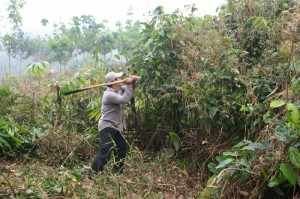Project Phongsali: Teachers ask that we clear land for expansion of the school grounds.

A teacher from the village school cuts brush in the schoolyard expansion area. WHWV will clear the area of any UXO so it will be safe for student use.
Day 47
The head schoolteacher finally wore down the last opposition to expanding the schoolyard. She is a force to contend with, and probably a great teacher. Every time I pass her classroom, she has her students on task doing math problems in their notebooks or copying her reading lesson from the chalkboard. To my surprise, the school in Sop Houn actually has some thin paperback math and reading textbooks for the students, although there is no library to provide supplementary reading material.
This morning, a Saturday, almost every teacher was at school. The head teacher was putting a select handful of students through a cram session in preparation for an upcoming competitive exam. The teacher is hopeful that her best young scholars earn distinction for their school and scholarship opportunities for themselves.
The remaining teachers were all in the proposed expansion area with their machetes cutting back all the jungle-like foliage (which covered the parcel so densely that it was impossible to walk the site). Only by following a machete-wielding teacher was I able to explore the area and pace off distances.
The teachers and a couple of teenage volunteers stayed at the task all morning, hacking wildly at the scrub and stacking all the cut brush in waist-high windrows. After the newly cleared land bakes in the sun for a few days, and the cut foliage withers in the heat, our de-miners will walk the open areas and search for UXO with their metal detectors. Then, we’ll have villagers use long poles to flip the windrows onto the cleared lanes, and we’ll search the land where the brush piles were first sitting.
Then, the whole parcel will be burnt, just as these villagers burn their fields in preparation for planting. The teachers left several nice trees on the site that should tolerate the flames and survive the burn (although the last I heard, the staff was thinking of the site as a good place for rattan ball courts and a soccer filed; maybe the trees will stay, maybe they won’t).
While the teachers were cutting brush and the de-miners were searching for ordnance, the district Minister of Education dropped by to learn more about Project Phongsali. Mr. Xiong, a Hmong educator with 33 years experience, was very favorably impressed with both the commitment of the school staff and the professionalism of our clearance team.
At one point in our conversation Mr. Xiong shared what he felt were the two greatest school-related problems in the May District:
The greatest challenge is attracting teachers to accept employment (not attracting “the best teachers;” he implied that attracting “any” teachers was a challenge). He told me that in the six remote riverside villages that I visited recently by boat, the schools provide only three years of schooling because there are no teachers for the upper grades. And, he added, holding on to those teachers was an ongoing challenge. He said that people who have attained the knowledge and training required of a teacher rarely find life in a remote village to be satisfying.
The second problem Mr. Xiong cited was lack of parental support. He said that many parents in Phongsali, especially those who are illiterate subsistence farmers, cannot imagine a life for their children that differs from their own, and therefore many do not value formal education. Lacking support at home, many children in the district have poor attendance records and are not succeeding in school.
